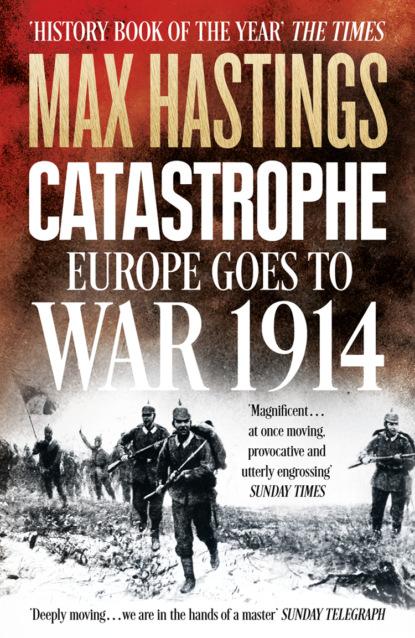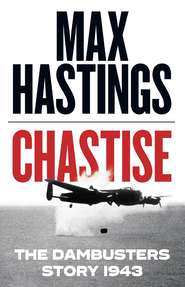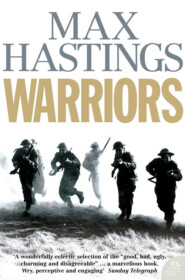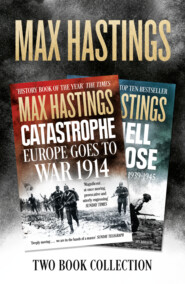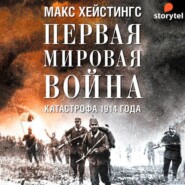По всем вопросам обращайтесь на: info@litportal.ru
(©) 2003-2024.
✖
Catastrophe: Europe Goes to War 1914
Настройки чтения
Размер шрифта
Высота строк
Поля
But all over Britain military establishments were receiving the mobilisation order. Capt. Maurice Festing of the Royal Marines was exasperated to get the call while playing in a cricket match at the corps depot outside Deal: he had scored 66 not out and just fulfilled a cherished ambition by driving a ball through the window of the sergeants’ mess. The colonel of the Royal Welch Fusiliers was attending a dinner party when an orderly bearing a message was announced. The guests were almost certain of its contents, but etiquette prevailed: the messenger was kept waiting until dinner was finished and the ladies had retired, before being permitted to deliver the regiment’s mobilisation telegram.
Britain was the only major power to debate in parliament its entry into the war. At 3 o’clock that afternoon of 3 August, Grey, visibly strained and exhausted, rose in the Commons to make the government’s first formal statement about the crisis. He was no great orator, and such grace time as he might have used to prepare a speech was stolen by Prince Lichnowsky, who called at his office to make a futile final plea for Britain not to regard the passage of German troops through just one small corner of Belgium as a casus belli. It was the two men’s last meeting.
The floor of the House was packed, as were the Diplomatic and Strangers’ Galleries. Asquith was expressionless as Grey invited the House to consider the crisis from the viewpoint of ‘British interests, British honour and British obligation’. The foreign secretary told Members of the secret naval arrangement with France, and how the government had concluded that it could not leave the Germans free at will to bombard the French north coast, on Britain’s doorstep. Tories cheered while Liberals sat silent, many unpersuaded. Then Grey, having spoken unimpressively about British interests and trade routes, was suddenly roused to a passion he had never before displayed, in describing the violation of Belgian neutrality. ‘Could this country stand by and watch the direst crime that ever stained the face of history, and thus become participators in the sin?’
He reverted to a familiar but fundamental theme of British governments for centuries – the European balance of power. Britain, he said, must take a stand ‘against the unmeasured aggrandisement of any power whatsoever’. After seventy-five minutes, he concluded with a dramatic peroration and appeal: ‘I do not believe for a moment that, at the end of this war, even if we stand aside, we should be able to undo what had happened … to prevent the whole of the West of Europe opposite us from falling under the domination of a single power … and we should, I believe, sacrifice our respect and good name and reputation before the world and should not escape the most serious and grave consequences.’
This last statement has become, for the past century, the focus of every argument about whether Britain should, or should not, have entered the First World War. The Commons, that afternoon, received his words with overwhelming acclaim. It was because Grey, through his twenty-nine years as an MP, had become known as a man of compulsive taciturnity, that his eloquence on this occasion achieved its remarkable effect. Simon and Beauchamp, having heard him, withdrew their resignations. The mood of the Liberal Party, instinctively pacifistic, underwent a dramatic shift towards war – though Parliament was never invited to vote on the final step.
‘What happens now?’ Churchill demanded as he and Grey left the House together. An ultimatum would be sent to Berlin, said the foreign secretary, demanding German withdrawal from Belgium within twenty-four hours. Sir Francis Bertie wrote: ‘Grey’s speech … was splendid and has given much more satisfaction [in Paris] than I expected. Germany was determined to have war and tried all she knew to lure us into abstention from the struggle.’ Jules Cambon said after the conflict: ‘We were extraordinarily fortunate that Britain’s Liberal Party was then in government. Had it been in opposition, it would perhaps have delayed British intervention.’ In this he was probably correct; it is by no means certain that if a Conservative government had been eager to fight, the Liberals would have fallen into step. Their contrarian instinct might have proved too strong, as it did for two minor cabinet members – Lord Morley and John Burns – who quit.
That night, even after all the dramas of the day, uncertainty persisted about what practical military measures Britain would adopt. The foreign secretary displayed awesome naïveté, and severely injured his reputation before posterity, when he told the Commons that, since Britain was a naval power, by entering the war ‘we shall suffer but little more than we shall suffer if we stand aside’. Because such vestigial delusions persisted in government, no minister would authorise immediate dispatch of an army to the continent. This prevarication exasperated soldiers who knew that hours mattered in giving orders for a British Expeditionary Force to muster and sail before the German juggernaut swept into Belgium and France.
Coudourier de Chassigne, London correspondent of Le Figaro, rang Tom Clarke, news editor of the Daily Mail, in pursuit of tidings. ‘Are you going to go to the help of France?’ he demanded urgently. ‘I know the whole British nation is with us, but this rotten “wait and see” government of yours, when will they move? Soon it will be too late. It is terrible … Cannot Lord Northcliffe and the Daily Mail do something?’ An old Frenchman peered at a poster outside the local newspaper office in Nice and declared disgustedly: ‘L’Angleterre se dégage! C’est ignoble.’ Early on that evening of 3 August, the German ambassador in Paris called upon René Viviani and read aloud to him a declaration of war, the moral force of which was blunted by its deceits. The document claimed that French aircraft had bombed Nuremberg and Karlsruhe, and overflown Belgium in breach of its neutrality. Viviani denied the charges, then the two men silently bowed and parted. Gen. Joffre took a formal farewell of Poincaré before leaving for his headquarters, from which, through the months that followed, he would exercise a power more absolute than that of any other national commander.
Just after 8 o’clock on the morning of 4 August, the first German troops crossed the Belgian border at Gemmenich, thirty miles from Liège. Belgian gendarmes made the futile but significant gesture of firing on them before taking to their heels. At noon, King Albert formally appealed for aid to Britain, as a guarantor of Belgian neutrality. Then, dressed in field uniform and mounted on a charger, he rode at the head of a little procession of carriages, one of which held his wife and children, to the parliament building in Brussels. Once dismounted and in the chamber, he created an inimitable moment of theatre by demanding of members: ‘Gentlemen, are you unalterably decided to maintain intact the sacred gifts of our fore-fathers?’ As one man they rose, shouting, ‘Oui! Oui! Oui!’
In Berlin the Kaiser summoned the Reichstag deputies to his palace. He received them in helmet and full regimentals, flanked by Bethmann in the uniform of the Dragoon Guards. He said nothing of Belgium, but instead declared the war to have been provoked by Serbia with the support of Russia: ‘We draw the sword with a clear conscience and clean hands.’ His speech prompted wild applause. By contrast, when Bethmann later addressed the Reichstag, he displayed a frankness that Tirpitz afterwards branded as madness: ‘Our invasion of Belgium is contrary to international law, but this wrong – I speak openly – that we are committing – we will make right as soon as our military objective has been attained.’ Social democrats applauded as enthusiastically as did conservatives.
Asquith and Grey found themselves cheered by crowds in Whitehall as they hastened to and from the Commons on 4 August. The prime minister wrote to Venetia Stanley: ‘Winston, who has got on all his war-paint, is longing for a sea-fight in the early hours of tomorrow morning … The whole thing fills me with sadness.’ That afternoon, King George V’s proclamation of mobilisation was read to the Commons, following which Asquith rehearsed to the House the British ultimatum to Germany, which required an answer by midnight – 11 p.m. London time. The final part of the document was finally dispatched only at 7 p.m., after Grey learned that the Kaiser’s forces had entered Belgian territory. When Bethmann received it from the British ambassador, he claimed that ‘my blood boiled at this hypocritical harping on Belgium which was not the thing that had driven England into war’. The chancellor delivered a harangue to Sir Edward Goschen, pinning upon Britain blame for war and all that followed, and concluding: ‘all for just a word – “neutrality” – just for a scrap of paper’. The phrase passed into history. A host of Germans professed to regard British intervention as a betrayal.
In London as darkness fell, the cabinet met once more, to be told that Germany already considered itself at war with Britain. After further debate, they sat together in the Downing Street council room, waiting upon the clock chimes. As soon as Big Ben struck the first note of eleven, the government knew the worst. Twenty minutes later, the War Telegram was dispatched in plain language to the British Army. Norman Macleod perceived during the preceding twenty-hours ‘an extraordinary change in public feeling – up till Monday at any rate strong anti-war party – “Neutrality League” forward – but German refusal to respect neutrality of Belgium absolutely destroyed it’. He noted ‘another remarkable change. On Fri & Sat there had been panic in City & rush for food supplies. [By Monday] there was a feeling of complete confidence in the Govt – I have never seen anything like it, certainly not at the time of the Boer War.’
In the Royal Marine mess at Chatham on the night of 4 August a waiter handed a telegram to the corps commandant, who read it aloud: ‘Commence hostilities against Germany at once.’ This was received with applause by the assembled officers, many of whom would be dead within a year. Britain’s dominions and colonies, led by India, Canada, Australia, New Zealand and South Africa, were not consulted in any way about the decision to fight: their governors-general merely issued proclamations on their own authority, declaring them to be in a state of war with Germany, alongside the Mother Country. Only a few old Boers’ voices were raised in demurral. One of them, Jacobus Deventer, summoned his commando then telegraphed his former general, Louis Botha, now South Africa’s prime minister: ‘All my burghers armed, mounted and ready. Whom do we fight – the British or the Germans?’ He eventually accepted an order to join a force mustering to invade German South-West Africa, though some others mounted a short-lived anti-British rebellion.
Even many intelligent and informed Europeans failed to grasp the gravity of the course of action to which they had committed themselves. This is emphasised by the remarks of British leaders who expressed gratitude that war had reprieved the country from a bloody showdown in Ireland. In Grey’s Commons speech of 3 August he made an almost frivolous aside: ‘One thing I would say: the one bright spot in the very dreadful situation is Ireland.’ Sir William Birdwood, secretary to the government of India, wrote: ‘What a real piece of luck this war has been as regards Ireland – just averted a Civil War and when it is over we may all be tired of fighting.’
Ramsay MacDonald, who resigned the Labour Party leadership when his followers – like their German counterparts – decided to vote in favour of war credits, won some cheers when he told the Commons that Britain should have remained neutral, though when he went on to assert that ‘in the deepest parts of our hearts we believe that [would have been] right, and that alone was consistent with the honour of this country and the traditions of the party now in office’, he was received with a derisive laughter that sensitive witnesses thought unseemly. Mr Ponsonby, MP for Stirling Burghs, said that ‘we were on the eve of a great war and he hated to see people embarking on it with a light heart’, which prompted some assenting voices. Another MP, Mr Wedgwood, said that this was not going to be ‘one of the dear old wars of the 18th century … but a matter of sustaining the civilisation which it had taken centuries to bring about’. Perhaps the wisest comment, though at the time it received scant applause, also came from Ramsay MacDonald: ‘no war is at first unpopular’.
In the last days of the crisis, many of the principals – the greatest men of their nations, the most powerful people in the world – experienced moments when they shrank in size. They glimpsed the horror of the consequences of the courses they were pursuing, and looked back over their shoulders in yearning. This was true of the Kaiser, Bethmann and Tsar Nicholas; but not, apparently, of any of the Austrians, or Moltke, or Sazonov. The French were astonishingly fatalistic about the need to support Russia, if only because they were convinced – almost certainly correctly – that the German army would anyway fall upon themselves as a partner in the Entente. The British, save a few wild men such as Churchill, were least eager for war, but identified in the violation of Belgium a justification for joining the struggle. Because Britain was a Great Power, they believed that when great issues were at stake, it must be seen to play a great part.
In the last days of peace Vernon Kell, director of the British security service MI5, stayed at his office in Watergate House around the clock, organising arrests of known German agents. Although his infant organisation boasted a staff of only seventeen, he had forged effective links with county chief constables: between 3 and 16 August, twenty-two arrests were made. Some spies escaped in the fashion of Walter Rimann, a language teacher in Hull who caught the Zeebrugge ferry. It is thought that a few others remained undetected, but if so they made little contribution to Germany’s war effort.
Most of those caught had been identified through the interception of their correspondence with Germany’s intelligence service, the Nachrichten-Abteilung, under Home Office warrant – a system fostered by Winston Churchill. The Kaiser raged about the incompetence of his spy chiefs. Gustav Steinhauer, ringmaster of the British network, recorded Wilhelm demanding: ‘Am I surrounded by dolts? Who is responsible?’ German military intelligence had focused its efforts exclusively on France, leaving the navy to handle Britain. Steinhauer, who often travelled there in the pre-war period, had recruited agents chiefly by writing unsolicited letters to German expatriates; his most active ‘postman’ was Karl Ernst, a Pentonville barber, who approached seaman customers for information. German wartime intelligence in Britain never recovered from the 1914 round-up: as late as 21 August, Berlin was unaware that a British Expeditionary Force had been convoyed to France.
Meanwhile, Bernard Shaw wired his German translator: ‘YOU AND I AT WAR CAN ABSURDITY GO NO FURTHER. MY FRIENDLIEST WISHES GO WITH YOU UNDER ALL CIRCUMSTANCES.’ Lord Northcliffe said to his erstwhile Vienna correspondent Wickham Steed, ‘Well it’s come!’ Steed answered, ‘Yes, thank God!’ Memories of Queen Victoria caused many Russians to refer to England as ‘Anglichanka’ – the Englishwoman. A peasant said in August 1914 that ‘he was glad that the Anglichanka was with Russia, because first she was clever and would help; secondly, if things went badly with Russia, she was good and would help; thirdly, if it came to making peace, she was determined and would not give way’.
Fran Šuklje was a well-known Slovenian sage, sixty-five in 1914. On 4 August this unwilling subject of the Hapsburgs was sitting under the trees in the famous Stembur garden in Kandija when he read the news of Britain’s declaration of war. He told the little crowd of disciples around him: ‘Now you will give thanks to God if this war is over in three years.’ His words quickly spread among his fellow citizens, ‘whose unanimous judgement was that I had gone mad. They assume an outcome in three weeks, three months at the most.’ In Berlin, Frederick Wiles of the Daily Mail described scenes at the British embassy that day: ‘the realisation of what was now upon them turned the Germans into infuriated barbarians … Stones, keys, sticks, knives, umbrellas – any and everything which could be thrown were hurtling through the smashed windows.’
At an English country tennis party, the writer Jerome K. Jerome expressed ‘relief and thankfulness … I was so afraid Grey would climb down at the last moment … It was Asquith I was doubtful of. I didn’t think the old man had the grit … Thank God, we shan’t read “Made in Germany” for some little time to come.’ On the night of 4 August, as mindless crowds roared and sang outside Buckingham Palace, Maurice Baring watched a drunken man in evening dress harangue passers-by from the roof of a taxi in Trafalgar Square.
Even after war was declared, impassioned dissenters remained. On 5 August C.P. Scott argued in the Manchester Guardian: ‘By some hidden contract England has been technically committed behind her back to the ruinous madness of a share in the violent gamble of a war between two militarist leagues … It will be a war in which we risk everything of which we are proud, and in which we stand to gain nothing … Some day we will regret it.’ Many British people in the twenty-first century believe that Scott was right, chiefly in the light of the horror of the experience that followed, but also because they are unpersuaded that it was necessary to resist in arms the Kaiser’s Germany at such cost.
Would any of the Entente Powers have acted differently had they known of the profound complicity of the Serbian army, though not the government, in the murder of Franz Ferdinand? Almost certainly not, because this was not why the Austrians and Germans acted, or their opponents reacted. The Russians simply considered the extinction of a small Slav state as an excessive and indeed intolerable punishment for the crime of Princip, and for that matter Apis. Unless France had swiftly declared its neutrality and surrendered its frontier fortresses as Germany demanded, its alliance with Russia would have caused Moltke to attack in the West. The British were entirely unmoved by Serbia’s impending fate, and acted only in response to the German violation of Belgian neutrality and the threat to France. The various participants in what would soon become the Great War had very different motives for belligerence, and objectives with little in common. Three conflicts – that in the Balkans over East European issues, the continental struggle to determine whether German dominance should prevail, and the German challenge to British global naval mastery – accomplished a metamorphosis into a single over-arching one. Other issues, mostly involving land grabs, would become overlaid when other nations – notably Japan, Turkey and Italy – joined the struggle.
Many people in Britain have argued through the past century that the price of participation in the war was so appalling that no purpose could conceivably justify it; more than a few blame Sir Edward Grey for willing Britain’s involvement. But, granted Germany’s determination to dominate Europe and the likely consequences of such hegemony for Britain, would the foreign secretary have acted responsibly if he had taken no steps designed to avert such an outcome?
Lloyd George in his memoirs advanced a further popular argument against the conflict, laying blame upon the soldiers he hated: ‘Had it not been for the professional zeal and haste with which the military staffs set in motion the plans which had already been agreed between them, the negotiations between the governments, which at that time had hardly begun, might well have continued, and war could, and probably would, have been averted.’ This was nonsense. What happened was not ‘war by accident’, but war by ill-conceived Austrian design, with German support.
Today, as in 1914, any judgement about the necessity for British entry must be influenced by an assessment of the character of Kaiser Wilhelm II’s empire. It seems frivolous to suggest, as do a few modern sensationalists, that a German victory would merely have created, half a century earlier, an entity resembling the European Union. Even if the Kaiser’s regime cannot be equated with that of the Nazis, its policies could scarcely be characterised as enlightened. Dominance was its purpose, achieved by peaceful means if possible, but by war if necessary. The Germans’ paranoia caused them to interpret as a hostile act any attempt to check or question their international assertiveness. Moreover, throughout the July crisis they, like the Austrians, consistently lied about their intentions and actions. By contrast, whatever the shortcomings of British conduct, the Asquith government told the truth as it saw this, to both its allies and its prospective foes.
The Kaiserreich’s record abroad was inhumane even by contemporary standards. Isabel Hull has written of ‘a juggernaut of military extremism’, unchecked by any effective civilian authority. Berlin mandated in advance and applauded after the event the 1904–07 genocide of the Herero and Namaqua peoples of German South-West Africa, an enormity far beyond the scope of any British colonial misdeed. German behaviour during the 1914 invasion of Belgium and France, including large-scale massacres of civilians endorsed at the highest level, cannot be compared with what took place in the Second World War, because there was no genocidal intent, but it conveyed a profoundly disturbing image of the character of the regime that aspired to rule Europe.
It seems mistaken to suppose that neutrality in 1914 would have yielded a happy outcome for the British Empire. The authoritarian and acquisitive instincts of Germany’s leadership would scarcely have been moderated by triumph on the battlefield. The Kaiser’s regime did not enter the war with a grand plan for world domination, but its leaders were in no doubt that they required huge booty as a reward for the victory they anticipated. Bethmann Hollweg drafted a personal list of demands on 9 September 1914, when Berlin saw victory within its grasp. ‘The aim of the war,’ he wrote, ‘is to provide us with [security] guarantees, from east to west, for the foreseeable future, through the enfeeblement of our adversaries.’
France was to cede to Germany the Briey iron deposits; Belfort; a coastal strip from Dunkirk to Boulogne; the western slope of the Vosges mountains. Her strategic fortresses were to be demolished. Just as after 1870, cash reparations would be exacted sufficient to ensure that ‘France is incapable of spending considerable sums on armaments for the next eighteen to twenty years’. Elsewhere, Luxembourg would be annexed outright; Belgium and Holland transformed into vassal states; Russia’s borders drastically shrunken; a vast colonial empire created in central Africa; a German economic union extending from Scandinavia to Turkey.
Georges-Henri Soutou has convincingly argued that Bethmann was never as serious about his territorial demands – he strove to dissuade the Kaiser from insisting upon annexation of Belgium – as about the intention to impose a customs union on the continent. But whatever means Berlin proposed to employ, the purpose was not in doubt; in Soutou’s words, ‘it is well understood that customs union must thereby make possible Germany’s control of Europe’. While other German leaders advanced different shopping lists, all took it for granted that the war could not end without their nation receiving what they deemed ‘appropriate’ territorial and financial rewards. Having vanquished its only important continental rivals, it is implausible that Germany would thereafter have been content to make a generous accommodation with a neutral Great Britain, or to acquiesce in its global naval mastery.
The Asquith government is often accused of opacity in European affairs, both strategic – between 1906 and 1914 – and tactical – during the July crisis. While Britain made itself a party to the Triple Entente, uncertainty persisted in all the capitals of Europe, London included, about whether it would join a European war. Yet the British had little power to control events. Though the Germans preferred not to fight them, they were seen in Berlin as marginal in a clash of continental forces. Only if Britain had adopted the domestically unacceptable course of creating a large standing army might it have been capable of playing an effective deterrent role in 1914. The most grievous British error was to suppose the nation could maintain its cherished balance of power on the continent without a credible mass of soldiers to support its diplomacy. But failure to create a conscript army can scarcely be characterised as warmongering.
The argument that Britain should have declared in advance of the 1914 crisis its determination to participate in any Russo-French clash with Germany ignores the nature of democracies, and the requirements of prudent statesmanship. No government could have commanded the support of Parliament for an open-ended commitment to join a European conflict without heed to the circumstances in which this evolved, and there is no reason why it should have done so. If in July 1914 Asquith had offered France and Russia unconditional support, he would have been guilty of the very recklessness – the issue of a ‘blank cheque’ – for which Germany has been justly condemned in its conduct towards Austria-Hungary, and to a lesser degree France also in its commitment to Russia.
Britain cherished the status quo, and was committed to peace, because it still appeared to be global top dog. The Asquith government harboured a sensible unease about Russia and the follies of which its government was capable; it had no desire to promote French bellicosity. Thus its only rational course in the decade preceding the war, and indeed in July 1914, was to offer its allies goodwill and provisional support, the scope and nature of which must depend on events and exact circumstances. The failure of this policy is self-evident: Britain’s tentative approach to European commitments, and especially to the Entente, sufficed to involve it in history’s greatest conflict, but not to prevent such a disaster. It nonetheless seems hard to conceive of any alternative pre-war British diplomatic path which would have commanded domestic political support, and persuaded Germany that the risk of war was unacceptable.
Those who claim that a general conflict was avoidable even after Austria declared war on Serbia, and who hold Russia responsible for what followed, imply that Austria and its German guarantor should have been allowed to have their way at gunpoint in the Balkans, in Belgium and indeed across Europe. Only the German ultimatum to Belgium enabled the war party in the British cabinet to obtain a mandate. It is sometimes said that this was a mere pretext – a figleaf – since Grey, Churchill and several of their colleagues were bent upon belligerence even before the issue of Belgium emerged. But it remains doubtful that they could have carried their point but for the violation of Belgian neutrality. It does not seem ignoble or foolish that much of the Commons and the British people seized upon this as a just casus belli, whereas they recoiled from going to war to support Serbia, or for that matter merely to fulfil Britain’s ill-defined commitment to the Triple Entente. Even if Germany is acquitted of pursuing a design for general European war in 1914, it still seems deserving of most blame, because it had power to prevent this and did not exercise it.
On 3 August the Kaiser told his orderlies to lay out field-grey uniform, topboots, brown gloves, and a helmet without plumes for his address to the Reichstag on the morrow. Then he decided that a more magnificent show was appropriate. He chose to appear in full dress, accompanied by every available senior officer in Berlin, adorned with their medals and sashes. In all his splendour as Germany’s Supreme Warlord, with much emotion he told the assembled members next day: ‘From the bottom of my heart I thank you for your expressions of love and fidelity. In the struggle now ahead of us, I see no more parties in my Volk’ – ‘Ich kenne keine Parteien mehr, ich kenne nur Deutsche’ – ‘among us there are only Germans’. Wilhelm was now to experience a few joyous weeks of the military glory he had always dreamed of. Thereafter, however, the shades would close in upon him – and upon Europe.
3 (#ulink_17767937-c894-58ea-9160-63ff8589755c)
‘The Superb Spectacle of the World Bursting Into Flames’ (#ulink_17767937-c894-58ea-9160-63ff8589755c)
1 MIGRATIONS (#ulink_25bbce96-71ba-5b95-90c5-d8c0a66d83ae)
Across continental Europe, for the last time in history proclamations of war were accompanied musically as well as figuratively by a clarion call. In cities such as Freiburg a trumpeter and a police officer toured the city’s main squares in a chugging automobile, halting at each one to rehearse the tidings. Most of the newly warring nations accomplished the transition from peace with doom-laden efficiency. Lt. Col. Gerhard Tappen, Moltke’s chief of operations, admitted to a ‘peculiar feeling’ as he unlocked the office safe and withdrew Germany’s ‘Deployment Plan 1914/15’, but mobilisation represented the greatest professional triumph of the chief of staff’s career. Before war came, Berlin feared that socialist-inspired rail strikes might cause disruptions, but none occurred. There were few absentees among the four million men summoned to the colours.
Governments’ contingency plans extended well beyond the mechanics of mobilisation. Maurice Hankey, secretary of Britain’s Committee for Imperial Defence, had since 1910 produced annually updated editions of ‘The War Book’. This was a red quarto volume, sub-headed in gold lettering ‘Co-Ordination of departmental action on the OCCURRENCE OF STRAINED RELATIONS and on the OUTBREAK OF WAR’. The latest edition, circulated throughout Whitehall on 30 June 1914, contained 318 grey-blue pages, detailing the responsibilities of every department of state, first in the ‘Precautionary stage’: ‘The Secretary of State [for foreign affairs], foreseeing the danger of this country being involved in war in the near future, decides to warn the Cabinet to this effect.’ The War Book, with gentlemanly circumlocution, stressed the importance of discretion: ‘The Under-Secretary of State specially instructs any member of his staff who may be concerned that the greatest reticence must be observed in regard to the existence of strained relations and all matters relating to precautionary measures.’
Thereafter, the Book catalogued all manner of necessary practical steps, such as the submission to Parliament of a Bill for the control of aliens, introduction of censorship, seizure of enemy merchant vessels, severance of enemy submarine telegraph cables, embodiment of the Channel Islands militia, and notice to neutral powers of an impending blockade of enemy ports. In addressing the management of telegraph traffic, an appendix stated: ‘In order that the greatest number of telegrams requiring Priority over all others should be indicated, it has been assumed … that the war would be one in which the United Kingdom would find herself immediately opposed by the three countries forming the Triple Alliance.’ The War Office was warned: ‘Certain defensive measures against treacherous or surprise attacks become necessary.’ The Admiralty chief censor’s telegraphic address was to be ‘Scoured, London’. The Home Office was instructed to alert chief constables ‘to pay special attention to the movements of suspicious foreigners’. During the first days of August, all this came to pass.
Serbs were dismayed that their country had been obliged to mobilise before the harvest was gathered, instead of waiting for autumn, as at the start of the two previous Balkan wars, when the barns were full. Not only the departure of men caused dismay, but also the spectacle of precious carts and oxen being driven away to the army. Nonetheless, Tadija Pejović remarked that everybody around him was singing, ‘because it is a Serb custom to sing when soldiers go to war’. Young and old alike had little notion how long their adventure might last. Uncomprehending children demanded to know why their homes were being broken up.
Generosity towards the enemy would soon be banished from every belligerent’s public life, but in August vestiges survived. Britain’s National Free Church Council adopted a resolution: ‘The crime and horror of a universal war has fallen upon European civilization. It is useless to seek nicely to apportion blame.’ H.W. Nevinson, Berlin correspondent of the Daily News, wrote of the young Germans whom he had watched march away: ‘finely-built and well-trained fellows they are, of a stock so much like our own at its best’. He applauded the well-tilled countryside, the neat and well-behaved children, and all that Germany had done to advance the world’s progress. In the same spirit, some British academics strove to sustain respect for the country that had now become their mortal enemy. ‘Only ignorance can afford to mock at German culture,’ wrote a Cambridge theologian.
A thirty-one-year-old schoolteacher living near Graz, who kept a diary in which she signed herself simply as ‘Itha J’, was an impassioned Austrian nationalist. She recoiled in disgust when her friend Martha described the bitterness of some men summoned to the colours. ‘I am sorry,’ Itha interrupted stiffly, ‘but it is incomprehensible that any man should complain. I call it cowardice – it could be nothing else.’ This was an age when classicism was an almost universal expression of literacy. Young Edouard Beer, one of four Belgian brothers who joined his country’s armed forces, quoted Caesar with some complacency: ‘Omnium Gallorum fortissimi sunt Belgae’ – ‘The Belgians are bravest of all Gauls’.
Writer Sergei Kondurashkin was holidaying with his family in southern Russia, where he glimpsed a microcosm of his nation’s vast mobilisation: ‘The omnipotent state apparatus of names and numbers was able to search out people even in the remote gorges of Caucasian mountains, beneath the Amanaus glaciers. Couriers came galloping with telegrams for doctors, professors and engineers – everyone to the war! Private rail travel stopped, the post became irregular, and for a time private telegrams were rejected. It seemed that the pattern of ordinary life around us, formed over centuries, was coming to a halt, soundlessly breaking up, as war established its own norms.’
Russia’s mobilised strength was on paper – full potential was never achieved – the largest of any belligerent, but most of those called to the colours had little notion of the cause. One man, Ivan Kuchernigo, described a scene in his village, where a policeman suddenly appeared, knocking on door after door to summon peasants to a meeting. They assembled amid general bewilderment and vain mutual questioning. Suddenly, the village elder called for silence: ‘Here’s what’s afoot boys! An enemy has turned up! He has attacked our Mother Russia – Matushku Rossiiu – and our Father-Tsar needs our help, our enemy for now is Germany.’ A buzz ran through the crowd: ‘It’s the Germans! The Germans.’ The elder shouted for quiet again: ‘OK boys, in order not to lose time messing with lists, whoever feels healthy and able to serve the Fatherland should show up in the office of the District Military Commander in Aleshka, and I advise you to bring with you two pairs of underwear, and they’ll give you anything else there, just do it quick.’ The crowd dispersed to their houses, forgetting work in the fields. Kuchernigo wrote: ‘My God, how many tears were spilled when we had to go.’ His five-year-old daughter sat in his arms, pressing against him and saying, ‘Daddy, why are you going? Why are you leaving us? Who’s going to earn money and get bread for us?’ She embraced and kissed her father, whose own tears were soon flowing. ‘I couldn’t answer her questions, and just answered, “I’ll be home soon, baby.”’
In France mobilisation continued for fifteen days, with draftees reporting by age groups, the youngest first, the oldest last: arrivals at barracks were processed with astonishing speed. From the moment a man was received, inside twenty minutes he was stripped of his civilian clothes, bathed, uniformed and dispatched to his unit. With the reinforcement of its colonial mercenary regiments, most of them North African, France mustered 3.8 million trained soldiers, approximately equal to the forces of Germany. Seventeen-year-old peasant Ephraim Grenadou was attending a wake following the funeral of a young friend when mounted gendarmes trotted into his little town of Saint-Loup in Eure-et-Loir to post a stark white proclamation: MOBILISATION GENERALE. ‘The schoolmaster shouted to us to sound the tocsin. Everyone crowded around the Mairie, having abandoned the fields in the midst of harvesting.’ Men quizzed each other: ‘When are you leaving?’ ‘The second day.’ ‘Me, the third.’ ‘Me, the 25th.’ ‘Oh, you will never go – we shall be back by then.’ Next day Achilles, Saint-Loup’s town crier, toured the community, proclaiming tidings preceded by trumpet calls: ‘Everybody who has good boots should take them. You will be paid 15 francs.’
Two police automobiles brought the order to the church square of Valtilieu in Isère at 4.30 on the afternoon of 1 August. Immediately the local bell-ringer summoned the population; the village teacher described the effect: ‘it seemed that suddenly the old feudal tocsin had returned to haunt us. Nobody spoke for a long while. Some were out of breath, others dumb with shock. Many still carried pitchforks in their hands. “What can it mean? What’s going to happen to us?” asked the women. Wives, children, husbands – all were overcome by anguish and emotion. The wives clung to the arms of their husbands. The children, seeing their mothers weeping, started to cry too.’ Most of the men resorted to the café, to discuss the practical issue of how the harvest was to be got in. The general mood was resolute.
Sergeant Paul Gourdant expressed dismay at leaving behind a bedridden wife and four children; he was distressed that the burden of caring for them would fall on his elderly parents. But religion provided a staff: ‘God gave me strength to put aside all my fears and anxieties and to think only of the defence of my country.’ Henri Perrin, who owned a little ironmongery in Vienne, hastened around the town settling debts, before painstakingly instructing his young wife about the shop’s management in his absence. Then the family fell on their knees and prayed together. The Perrins explained to their two small children that ‘Papa must go away for a while on business for the country.’ At thousands of railway stations, clusters of stoical, anxious or openly emotional relatives surrounded each man as he boarded the train. One shouted gaily, ‘All aboard for Berlin! And what fun we’ll have there!’ André Gide, a spectator, noted: ‘People smiled, but did not applaud.’ Some peasants treated the occasion as a holiday – these young men who had never experienced such an indulgence. A few fled to hide in the woods, but stern womenfolk drove most to report sheepishly to barracks.
Europe’s vast migration created a corresponding social upheaval. ‘So many men have left,’ reported a French regional newspaper, La Croix d’Isère, ‘that an atmosphere of sadness and doom pervades the small towns and villages of the Dauphiné.’ The rector of Grenoble Academy wrote: ‘all along the valley … the once familiar shouts and cries of farmers going to market, of animated “farm talk” in cafés and market squares, has given way to an anxious silence maintained by women, children and old men’. Machinery lay idle and bread ran short, with skilled workers gone and petrol stocks appropriated by the army. In Malleval, a public-spirited motorist siphoned the tank of his automobile, to provide just enough fuel to run a threshing machine for two days to finish the harvest.





